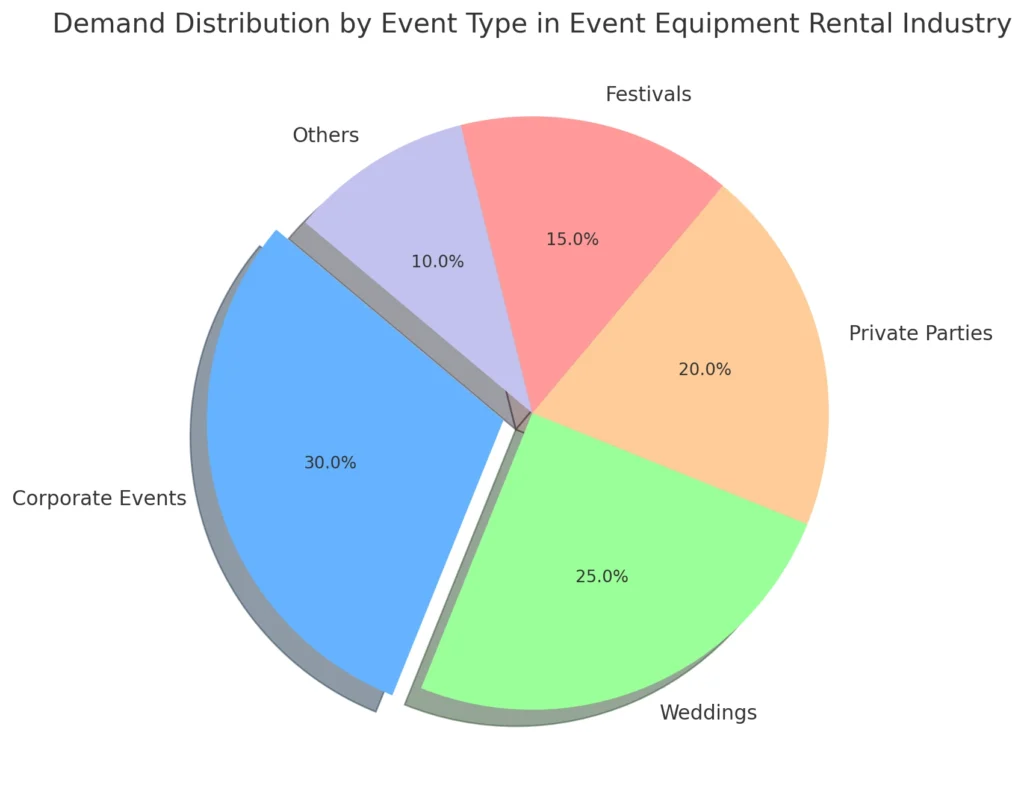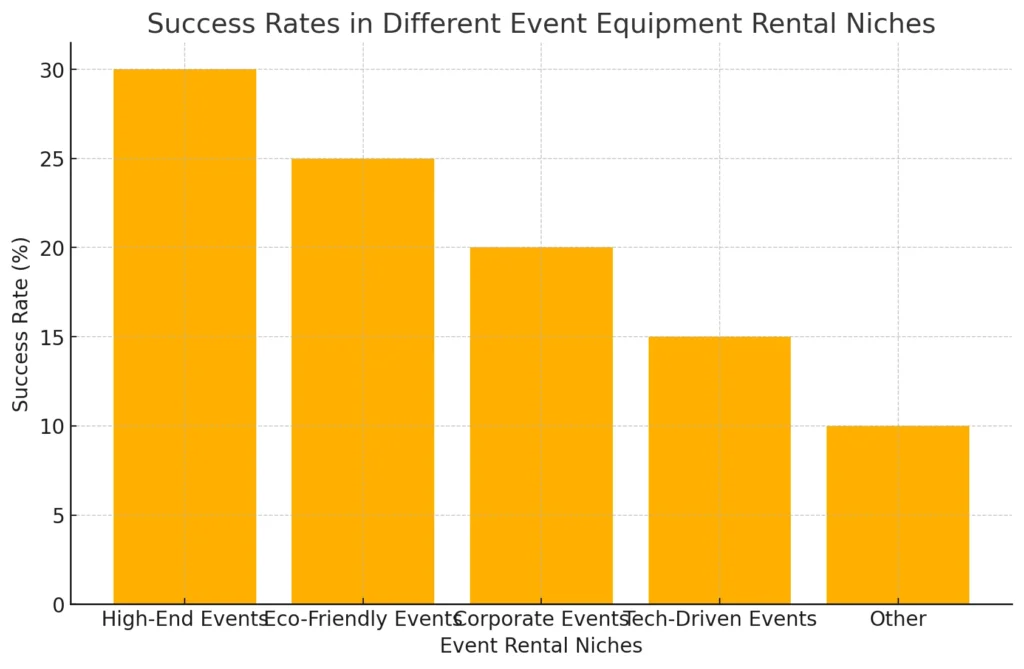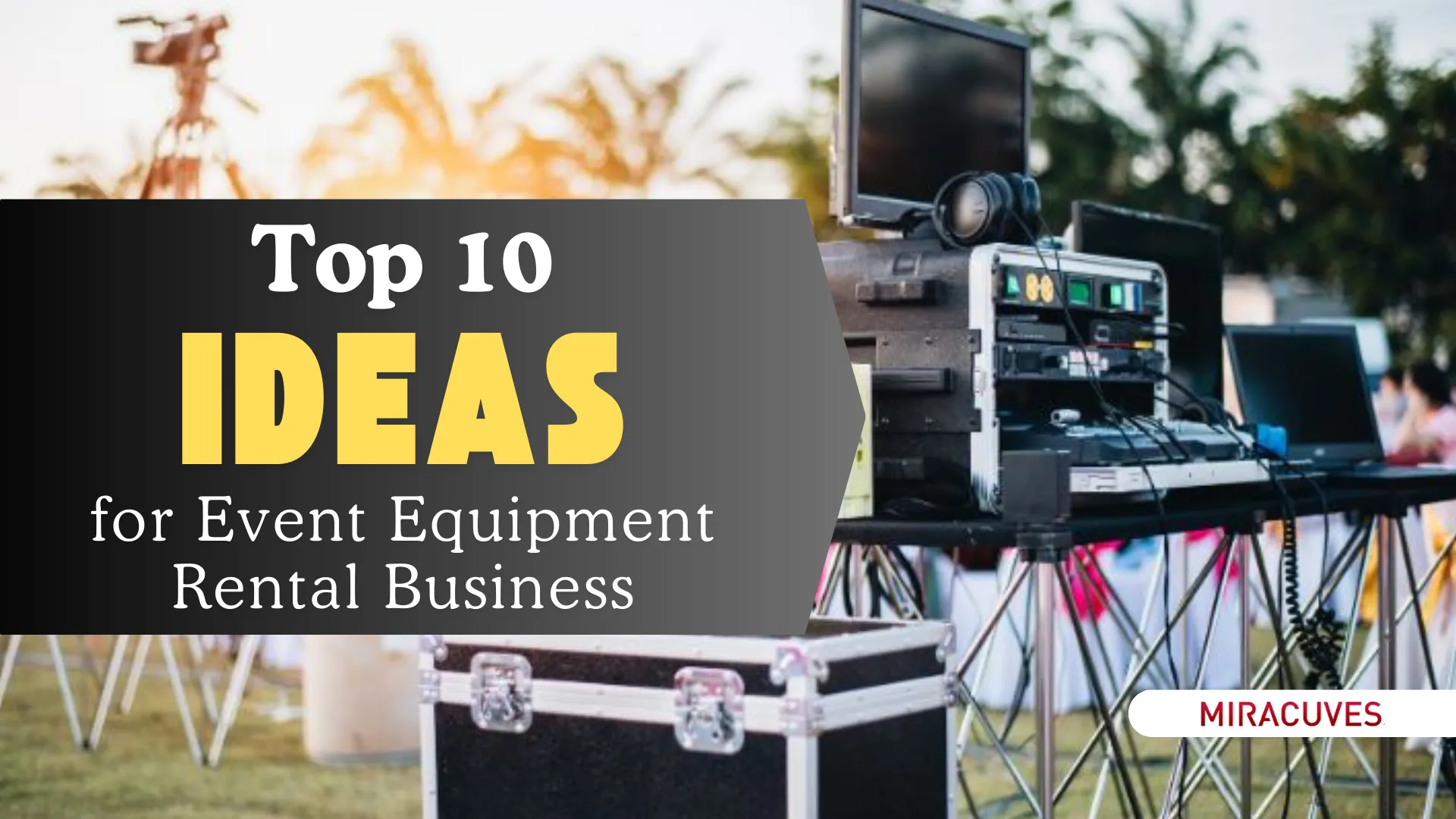The event equipment rental industry has emerged as a lucrative opportunity for aspiring entrepreneurs, catering to the growing demand for event setups without the hefty investment in permanent assets. From small-scale celebrations to large corporate events, businesses and individuals alike are increasingly opting to rent everything they need, from furniture and lighting to audio-visual equipment, freeing themselves from the hassle of ownership and maintenance. As the events market expands and people seek more elaborate and memorable gatherings, the potential for a profitable event rental business continues to rise.
Starting an event equipment rental business can be incredibly rewarding for those willing to tap into current trends and address diverse client needs. The key lies in understanding the essentials of the industry—knowing what items are in high demand, which sectors are most profitable, and how best to position your services. With a strategic approach and careful selection of rental items, you can enter this dynamic market and create a thriving business that meets the needs of private gatherings, corporate functions, and large-scale public events.
Read More “How to Build an App Like PlushCare: A Step-by-Step Guide“
Why Choose Event Equipment Rental?
The event equipment rental business is attracting entrepreneurs for good reasons: it offers high profitability, steady demand, and low entry barriers. As events of all scales continue to rise—from intimate backyard weddings to grand corporate expos—the need for rentable equipment is booming. Companies and individuals prefer renting high-quality items for a single event rather than investing in costly purchases and maintenance. This trend creates consistent demand, offering a reliable income stream for rental businesses, especially those that diversify their inventory to cater to various event types.

One key appeal of this industry is its adaptability. Event rental businesses can scale and specialize based on market demand, making it possible to start with a narrow focus, such as only renting out AV equipment or décor, and expanding as the business grows. Furthermore, with the rise of experiential events—where guests expect a more immersive and unique experience—the demand for specialty items such as photo booths, custom lighting, and interactive displays is soaring. This trend encourages innovation, giving rental businesses ample room to introduce creative offerings and set themselves apart.
The industry’s growth potential is also reinforced by seasonal trends. For instance, summer often sees a spike in outdoor weddings and festivals, while the holiday season increases demand for corporate and family gatherings. Entrepreneurs in this field can leverage these cycles, ensuring a steady flow of business year-round by adjusting their inventory to meet seasonal needs.
According to recent statistics, the market size and growth rate for event rentals continues to expand as more clients seek cost-effective solutions for their events.
Read More :-Top 10 Ideas for Bicycle Repair and Rental Business Startups
Current Trends and Future Opportunities in Event Equipment Rental
| Trend/Technology | Description | Benefits | Popularity Growth Rate |
|---|---|---|---|
| Eco-Friendly Rentals | Offers sustainable options like biodegradable items, energy-efficient lighting, and reclaimed furniture. | Attracts environmentally-conscious clients; reduces carbon footprint. | High |
| Immersive Tech (AR/VR) | Provides interactive experiences, such as virtual tours or augmented reality for events. | Enhances guest engagement; creates memorable event experiences. | Moderate |
| Custom Lighting Solutions | Specialty lighting, including LED, uplighting, and themed lighting options. | Creates ambiance; adaptable for various event themes. | High |
| Automated Booking Software | Manages inventory, bookings, and client orders digitally for seamless operations. | Increases efficiency; reduces manual errors and double-bookings. | High |
| Interactive Photo Booths | Modern photo booths with digital props, GIFs, and instant sharing options. | Boosts guest interaction; adds fun elements to events. | Moderate |
The event equipment rental industry is evolving rapidly, driven by changing consumer preferences and technological advancements. Today’s clients are seeking unique and immersive experiences that set their events apart, which has led to an increase in demand for specialized equipment and themed decor. Custom lighting, high-quality AV systems, and interactive elements like photo booths or virtual reality stations are now becoming standard for both corporate and private events. This trend represents a significant opportunity for rental businesses to expand their offerings with items that provide a memorable experience.
Another notable trend is the shift toward sustainable and eco-friendly events. Many clients are now opting for rental companies that offer eco-conscious options, such as biodegradable tableware, energy-efficient lighting, or reclaimed furniture. By embracing these sustainable options, rental businesses not only appeal to environmentally-conscious clients but also create a unique selling point that sets them apart in a competitive market.
In addition to client preferences, technology is revolutionizing how rental businesses operate. Companies are increasingly leveraging software to manage bookings, optimize inventory, and streamline logistics, which enhances customer satisfaction and minimizes errors. This trend opens up further opportunities for rental businesses to implement digital solutions, ensuring smoother operations and better client experiences.
Read More :-Top 10 Ideas for Fitness Equipment Rental Business Startups
Top 10 Ideas for Event Equipment Rental Business Startups
Launching an event equipment rental business means catering to a wide variety of events, each requiring unique items and setups. From corporate gatherings to weddings and outdoor festivals, the possibilities for rental options are endless. To succeed, however, you need to select equipment that not only meets market demand but also aligns with your budget and business goals. Here are the top 10 ideas for event equipment rentals that can help you tap into this profitable market.
| Rental Idea | Estimated Startup Costs | Target Market | Profit Potential |
|---|---|---|---|
| Audio-Visual Equipment | $10,000 – $20,000 | Corporate clients, educational institutions | High |
| Lighting Solutions | $5,000 – $15,000 | Wedding planners, concert organizers | High |
| Tent and Canopy Rentals | $7,000 – $12,000 | Outdoor wedding planners, festivals | Moderate to High |
| Furniture and Decor | $8,000 – $18,000 | Wedding planners, corporate clients | High |
| Catering Equipment | $3,000 – $8,000 | Catering companies, corporate events | Moderate |
| Dance Floors and Staging | $4,000 – $10,000 | Wedding planners, DJs, concert organizers | Moderate to High |
| Interactive Photo Booths | $2,000 – $6,000 | Corporate events, weddings, birthday parties | High |
| Luxury Restroom Trailers | $10,000 – $30,000 | High-end outdoor weddings, festivals | High |
| Eco-Friendly Event Supplies | $2,000 – $5,000 | Environmentally-conscious clients, festivals | Moderate |
| Virtual Reality Experiences | $6,000 – $15,000 | Corporate events, tech-focused gatherings | High |
1. Audio-Visual Equipment
- Why: Essential for corporate events, conferences, and large gatherings.
- Startup Requirements: High-quality speakers, microphones, projectors, and screens.
- Target Market: Corporate clients, educational institutions, and event planners.
- Estimated Costs: $10,000 to $20,000.
2. Lighting Solutions
- Why: Lighting sets the mood and theme for events, especially weddings and concerts.
- Startup Requirements: LED lights, uplighting, spotlights, and custom lighting options.
- Target Market: Wedding planners, concert organizers, and private party hosts.
- Estimated Costs: $5,000 to $15,000.
3. Tent and Canopy Rentals
- Why: A must for outdoor events to provide shelter and create defined spaces.
- Startup Requirements: Different-sized tents, canopies, and sidewalls.
- Target Market: Outdoor wedding planners, festivals, and corporate retreats.
- Estimated Costs: $7,000 to $12,000.
4. Furniture and Decor
- Why: Essential for all events, providing comfort and style.
- Startup Requirements: Chairs, tables, lounge furniture, and decorative pieces.
- Target Market: Wedding planners, corporate clients, and social event hosts.
- Estimated Costs: $8,000 to $18,000.
5. Catering Equipment
- Why: Needed for any event involving food, from weddings to corporate functions.
- Startup Requirements: Serving dishes, warming trays, beverage dispensers, and buffet tables.
- Target Market: Catering companies, wedding planners, and corporate events.
- Estimated Costs: $3,000 to $8,000.
6. Dance Floors and Staging
- Why: Popular for weddings, parties, and entertainment events.
- Startup Requirements: Portable dance floors, stages, and risers.
- Target Market: Wedding planners, DJs, and concert organizers.
- Estimated Costs: $4,000 to $10,000.
7. Interactive Photo Booths
- Why: Adds entertainment value to events and creates lasting memories.
- Startup Requirements: Photo booths, backdrops, digital props, and instant printing setups.
- Target Market: Corporate events, weddings, and birthday parties.
- Estimated Costs: $2,000 to $6,000.
8. Luxury Restroom Trailers
- Why: A valuable addition for outdoor events with extended durations.
- Startup Requirements: Portable restroom trailers with various amenities.
- Target Market: High-end outdoor weddings, festivals, and private gatherings.
- Estimated Costs: $10,000 to $30,000.
9. Eco-Friendly Event Supplies
- Why: Growing demand for sustainable events.
- Startup Requirements: Biodegradable tableware, reusable utensils, eco-friendly decor.
- Target Market: Environmentally-conscious clients, corporate events, and festivals.
- Estimated Costs: $2,000 to $5,000.
10. Virtual Reality (VR) Experiences
- Why: Offers cutting-edge entertainment options, especially for tech-savvy audiences.
- Startup Requirements: VR headsets, gaming software, and setup areas.
- Target Market: Corporate events, private parties, and tech-focused gatherings.
- Estimated Costs: $6,000 to $15,000.
Real-World Examples
One of the best ways to gain insight into the event equipment rental business is by looking at the success stories of established companies. Across the industry, many rental businesses have carved a unique niche, providing specialized services that cater to specific event needs. These real-world examples showcase how rental businesses have leveraged creativity, strategic inventory choices, and top-notch customer service to achieve success.

Take, for instance, a company specializing in high-end weddings and corporate events. By focusing on luxury items—such as elegant lounge furniture, custom lighting, and elaborate decor—they’ve built a reputation for delivering upscale experiences that clients are willing to pay a premium for. Their success demonstrates that investing in quality and attention to detail can attract a loyal, high-paying client base. This approach allows for strong profitability, even with fewer events, as each booking yields a substantial return.
Another notable example is a rental business targeting eco-friendly events. This company has embraced the rising demand for sustainable choices, offering biodegradable tableware, reclaimed wooden furniture, and energy-efficient lighting solutions. By aligning with clients’ environmental values, they’ve not only gained a competitive edge but also earned recognition as a responsible brand, attracting both eco-conscious customers and corporate clients focused on sustainability. This trend-driven strategy highlights how a business can thrive by addressing specific consumer preferences, in this case, sustainability.
For those entering the market, these examples underscore two critical factors for success: defining a clear market niche and building an inventory that aligns with that niche. Rental businesses that differentiate themselves with specialized equipment, whether for high-end, eco-friendly, or tech-savvy events, can create a lasting impact and stand out in a crowded marketplace.
Mistakes to Avoid When Starting a Business in Event Equipment Rental
| Common Mistake | Description | Preventive Measure |
|---|---|---|
| Poor Inventory Management | Overbooking or missing items due to lack of tracking. | Use an inventory management system to track all rentals and returns. |
| Lack of Insurance Coverage | Financial risk due to damage, theft, or liability issues. | Secure comprehensive insurance for equipment, damage, and liability. |
| Ignoring Seasonal Demand | Overstocked or underprepared for peak and off-peak seasons. | Adjust inventory based on seasonal trends and event demands. |
| Incorrect Pricing Strategy | Pricing too low or too high, affecting profitability or client interest. | Research competitor pricing and local market to find a balanced rate. |
| Neglecting Maintenance | Equipment may be damaged or unusable due to lack of upkeep. | Establish regular maintenance and inspection schedules. |
Starting an event equipment rental business has tremendous potential, but there are common pitfalls that many new entrepreneurs encounter. Knowing these mistakes ahead of time can help you steer clear of costly setbacks and set up your business for long-term success.
One of the most frequent mistakes is underestimating inventory needs and management. It’s essential to have enough inventory to meet demand but also to keep careful track of what’s available, rented, and returned. Poor inventory management can lead to double bookings, unfulfilled orders, and a loss of trust with clients. To avoid this, invest in a reliable inventory management system from the outset, allowing you to track every item accurately and reduce the risk of overbooking or missing equipment.
Another common error is failing to research insurance needs and liability coverage. In the event rental industry, equipment damage and liability are inevitable risks. Not having proper insurance coverage can lead to significant financial losses or even legal issues. Make sure to secure a robust insurance policy that covers damage, liability, and theft to protect both your assets and your business reputation.
Ignoring seasonal demand fluctuations is another trap for new rental businesses. Demand for certain types of event equipment can vary widely based on the season, with outdoor equipment in higher demand during warmer months and indoor or corporate items more popular in colder seasons. By understanding these patterns and planning inventory accordingly, you can avoid being overstocked with items that aren’t in demand or underprepared for peak times.
Finally, many new entrepreneurs struggle with pricing strategy. Setting prices too low might attract clients but can compromise profitability, while setting prices too high might drive potential clients away. Research your local market and competitor pricing to find a balanced strategy that maximizes both bookings and profit margins.
Utilizing an inventory management system from the start helps rental businesses track and manage items effectively, minimizing the risk of double bookings or lost equipment.
Read more: – Top 10 Ideas for B2B Equipment Rental Business Startups
Why Trust Miracuves Solutions for Your Next Project?
When it comes to launching a successful event equipment rental business, having the right support and tools can make all the difference. Miracuves Solutions has established itself as a reliable partner for entrepreneurs in the rental industry, offering comprehensive solutions tailored to meet the unique needs of event-focused businesses. With a strong track record of delivering high-quality, ready-made applications and tools, Miracuves Solutions empowers clients to streamline their operations and enhance customer satisfaction.
Miracuves Solutions specializes in custom software that helps rental businesses manage bookings, track inventory, and handle client communications effortlessly. This focus on functionality enables business owners to reduce manual tasks and minimize errors, ultimately saving time and boosting efficiency. Additionally, Miracuves Solutions understands the importance of scalability, providing solutions that grow with your business as you expand inventory, increase bookings, or enter new markets.
Choosing Miracuves Solutions also means gaining access to a wealth of industry expertise. With years of experience supporting event-focused companies, Miracuves Solutions provides insights and recommendations that help you avoid common pitfalls and capitalize on growth opportunities. Their dedicated approach to client success ensures that your business operates smoothly and stands out in the competitive rental market.
Conclusion
Starting an event equipment rental business opens the door to a thriving market with diverse opportunities for growth. By focusing on the right equipment, understanding market demands, and avoiding common pitfalls, you can create a successful and sustainable business in this exciting industry. From high-demand items like AV equipment and tents to specialized options like eco-friendly supplies and luxury restroom trailers, there’s plenty of room to carve out your niche and stand out.
As you build your business, remember the value of strategic planning and quality service. Meeting client expectations with reliability and flexibility will help you secure repeat business and foster positive word-of-mouth. The journey from idea to success is achievable, and with the right tools and insights, you’ll be well on your way to creating a profitable venture in the event equipment rental industry.
FAQs
What are the most popular items for an event equipment rental business?
Popular items include audio-visual equipment, lighting, tents, tables, and chairs. Specialty items like interactive photo booths and luxury restroom trailers are also in demand for more unique events.
How much does it cost to start an event equipment rental business?
Startup costs can vary widely based on inventory choices, but most businesses can expect to invest between $5,000 and $30,000 initially, depending on the range and quality of equipment.
How can I manage inventory effectively in a rental business?
Investing in inventory management software can greatly simplify tracking bookings, availability, and returns, helping to avoid overbooking and lost items.
Is it necessary to have insurance for rental equipment?
Yes, insurance is essential to protect against damage, loss, or theft of rental items. It also covers liability, reducing financial risk in case of accidents.
What steps should I take to attract more clients?
Marketing through social media, attending local events, and building partnerships with event planners are effective ways to attract new clients. Offering excellent customer service and flexible options also encourages repeat business.
Related Article:








